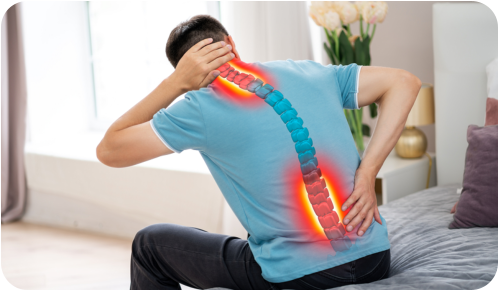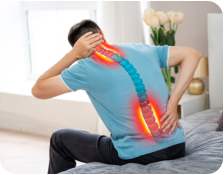ON-SITE
AFTER HOURS
ORTHOPEDIC




COPYRIGHT © MURPHY WAINER ORTHOPEDIC SPECIALISTS
ALL RIGHTS RESERVED.
WEB DEVELOPMENT BY A BETTER WEB, INC.
Specialties of Dr. Gebauer
Compression of the nerves as they exit the spine can cause
pain that radiates into the arms or legs. This is commonly
called a pinched nerve and, in the lower leg, sciatica. The
compression of the nerves is commonly caused by
herniated disks or arthritic changes in the spine.
Pain in the neck and low back is extremely common. There
are many potential causes, including problems with the disks,
arthritic changes in the facet joints (the joints in the back of
the spine), muscle injuries, or referred pain from areas
outside of the spine.
Herniated disks occur when part of the nucleus, the gel at the
center of the disk, pushes back into the spinal canal. The injury
to the disk can cause neck or low back pain. In some cases, it
can also compress the nerves, causing pain, numbness and/or
weakness in the arms or legs.
With fellowship training in neurosurgical and orthopedic spine care, Dr. Gebauer brings expertise from both disciplines to his
work with patients seeking help for spine and back problems. He enjoys working closely with each patient to determine the best
course of treatment for that individual. Often, he can help patients resolve their problems through the use of the latest non-
surgical treatments. When surgery is needed, Dr. Gebauer has extensive training in leading-edge techniques and many years of
experience as a surgeon.
SURGERIES HE PERFORMS INCLUDE:
•
Laminectomies
•
Microdiscectomies
•
Anterior Cervical Decompression and Fusion (ACDF)
•
Cervical Disk Replacement
•
Posterior Cervical Decompression and Fusion
•
Lumbar Fusion including:
o
Minimally Invasive Transforaminal Lumbar
Interbody Fusion (MIS TLIF)
o
Lateral Lumbar Interbody Fusion (LLIF)
o
Anterior Lumbar Interbody Fusion (ALIF)
o
Posterolateral Lumbar Fusion
•
Sacroiliac Joint Fusion
•
Spinal Cord Stimulation
•
Kyphoplasty
HIS SPECIALTIES INCLUDE:
Over time, most people will develop some degree of degeneration in
the spine. For most people, this will not cause any problems. For
some, this can lead to chronic back pain. For others, it can narrow the
spinal canal leading to stenosis. In the low back, this can cause pain in
the buttocks and legs while walking. In the neck, it can lead to
problems with balance, coordination, and dexterity.
Fractures in the spine can be the result of high-energy injuries such
as car accidents or falls from a height. However, when a patient has
osteoporosis (weakening of the bone), they can occur with little or no
trauma. Many fractures will heal over time and can be treated with
bracing. If there is a risk of injury to the nerves or the pain is severe,
surgery may be needed.
Minimally invasive surgeries provide the same results as more
traditional surgeries, but can be performed through small incisions
with less damage to the surrounding tissues. This leads to decreased
pain and quicker recovery after surgery. Motion preservation
surgeries are alternatives to more traditional fusion procedures and
prevent some of the long-term problems of removing some of the
motion in the spine.






Specialties of Dr. Gebauer
With fellowship training in neurosurgical and orthopedic spine care, Dr. Gebauer brings expertise from both disciplines to his
work with patients seeking help for spine and back problems. He enjoys working closely with each patient to determine the best
course of treatment for that individual. Often, he can help patients resolve their problems through the use of the latest non-
surgical treatments. When surgery is needed, Dr. Gebauer has extensive training in leading-edge techniques and many years of
experience as a surgeon.
SURGERIES HE PERFORMS INCLUDE:
•
Laminectomies
•
Microdiscectomies
•
Anterior Cervical Decompression and Fusion (ACDF)
•
Cervical Disk Replacement
•
Posterior Cervical Decompression and Fusion
•
Lumbar Fusion including:
o
Minimally Invasive Transforaminal Lumbar
Interbody Fusion (MIS TLIF)
o
Lateral Lumbar Interbody Fusion (LLIF)
o
Anterior Lumbar Interbody Fusion (ALIF)
o
Posterolateral Lumbar Fusion
•
Sacroiliac Joint Fusion
•
Spinal Cord Stimulation
•
Kyphoplasty
ON-SITE
AFTER HOURS
ORTHOPEDIC




COPYRIGHT © MURPHY WAINER ORTHOPEDIC SPECIALISTS
ALL RIGHTS RESERVED.
WEB DEVELOPMENT BY A BETTER WEB, INC.
Specialties of Dr. Gebauer
With fellowship training in neurosurgical and
orthopedic spine care, Dr. Gebauer brings
expertise from both disciplines to his work with
patients seeking help for spine and back
problems. He enjoys working closely with each
patient to determine the best course of
treatment for that individual. Often, he can help
patients resolve their problems through the use
of the latest non-surgical treatments. When
surgery is needed, Dr. Gebauer has extensive
training in leading-edge techniques and many
years of experience as a surgeon.
SURGERIES HE PERFORMS INCLUDE:
•
Laminectomies
•
Microdiscectomies
•
Anterior Cervical Decompression and
Fusion (ACDF)
•
Cervical Disk Replacement
•
Posterior Cervical Decompression and
Fusion
•
Lumbar Fusion including:
o
Minimally Invasive Transforaminal
Lumbar Interbody Fusion (MIS TLIF)
o
Lateral Lumbar Interbody Fusion (LLIF)
o
Anterior Lumbar Interbody Fusion
(ALIF)
o
Posterolateral Lumbar Fusion
•
Sacroiliac Joint Fusion
•
Spinal Cord Stimulation
•
Kyphoplasty
HIS SPECIALTIES INCLUDE:
Compression of the nerves as they exit the spine
can cause pain that radiates into the arms or legs.
This is commonly called a
pinched nerve and, in the
lower leg, sciatica. The
compression of the nerves
is commonly caused by
herniated disks or arthritic
changes in the spine.

Pain in the neck and low back is extremely
common. There are many potential causes,
including problems with the disks, arthritic
changes in the facet
joints (the joints in the
back of the spine),
muscle injuries, or
referred pain from areas
outside of the spine.

Herniated disks occur when part of the nucleus,
the gel at the center of the disk, pushes back into
the spinal canal. The injury to the disk can cause
neck or low back pain. In
some cases, it can also
compress the nerves,
causing pain, numbness
and/or weakness in the
arms or legs.

Over time, most people will develop some degree
of degeneration in the spine. For most people, this
will not cause any problems. For some, this can
lead to chronic back pain. For others, it can
narrow the spinal canal leading to stenosis. In the
low back, this can cause
pain in the buttocks and
legs while walking. In the
neck, it can lead to
problems with balance,
coordination, and
dexterity.

Fractures in the spine can be the result of high-
energy injuries such as car accidents or falls from a
height. However, when a patient has osteoporosis
(weakening of the bone), they can occur with little
or no trauma. Many
fractures will heal over
time and can be treated
with bracing. If there is a
risk of injury to the
nerves or the pain is
severe, surgery may be
needed.

Minimally invasive surgeries provide the same
results as more traditional surgeries, but can be
performed through small incisions with less
damage to the surrounding tissues. This leads to
decreased pain and quicker recovery after surgery.
Motion preservation surgeries are alternatives to
more traditional fusion
procedures and prevent
some of the long-term
problems of removing
some of the motion in
the spine.


Notice: All external links and PDFs will open in a new tab

External links and PDFs will open in a new tab




















































